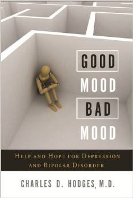Today we continue our interview with Dr. Charles Hodges as he talks to us about his book, Good Mood Bad Mood: Help and Hope for Depression and Bipolar Disorder – a very contemporary and relevant book indeed. If you missed Part 1 of our interview, you can catch up here.
Books At a Glance (Fred Zaspel):
Is there any case where depression may be caused by a chemical imbalance of some kind? And if so, can you tell us, even if just generally, how to distinguish normal sadness from a kind of depression that would actually benefit from medical treatment?
Hodges:
There are many diseases that result in an imbalance in hormones and that can be accompanied by a depressed mood. Cushing’s disease, thyroid disease, cancer of the pancreas, and lupus can result in a depressed mood to name a few. I think though you want to know if I believe there is a disease of the human body or brain that results in depression. The answer is mostly likely yes for a smaller number of people who struggle. It could amount to 5 to 10% of those diagnosed every year. Current research would indicate that up to 90% of those labeled with depression fall into the normally sad category. That leaves 10% who may have medical problems or a disease called depression whose pathology we do not understand to this day.
The best way to distinguish between normal and disorder sadness is to simply ask the struggler when their sad mood began and what happened at that time. Most will be able to tell you what and when their struggle began. Those who cannot tell you why or when their sadness began merit a complete medical work up and may benefit from medical treatment.
Books At a Glance:
What problems do you see with medications that are used to treat depression and bipolar disorder? What kind of track record do they have?
Hodges:
First let me say that no one should stop taking their medicine or change their dose based on anything that I have said in this interview. Changes in medicine should be done in cooperation with the physician who ordered it. Stopping these medicines abruptly can result in significant uncomfortable withdrawal effects. Taking medication for depression is a Romans 14 Christian Liberty issue. It is neither a right nor wrong issue. The important question to ask is will the medicine work and what are the side effects.
I would say that with today’s medications people who benefit the most would be those who fall into the 10% with disordered sadness. Current research indicates that our present selective serotonin re-uptake inhibitors work best for those who are very severely depressed who make up that 10%. All patients with depression are helped by counseling. The bottom 90% who make up the mild, moderate and even severely depressed are just as likely to benefit from counseling as they are taking medication in the short term. And in the long run they will benefit more from counseling.
There are many problems with the current group of medications that we have today. The biggest one is that they do not work very well for the majority of people who take them. As I said earlier current research would indicate that for most people talking with a caring, competent person will be just as effective in the short run as medication and in the long run will work better. This is true for between 80 to 90% of folks who are struggling with sadness.
An important point to remember is that for people who struggle with sadness, doing nothing is not a good strategy. Seeing a physician or talking with a pastor, friend or counselor is always a good place to start.
Side effects from the selective serotonin reuptake inhibitors that come from the same family as Prozac are numerous. Anxiety, a sense of restlessness and sleep disturbances are not uncommon. Loss of sex drive and sexual dysfunction are common. All SSRI antidepressants carry a warning for suicidal thinking particularly in young people. There are other significant medical problems and drug interactions that require a careful approach by a caring physician.
Books At a Glance:
You mention a common problem in medical practice – a patient complains of a physical ailment of some kind, and when the physician learns that the patient is sad, he diagnoses the patient with depression and prescribes medication accordingly, when in fact it was the ailment that often caused the sadness in the first place! We have seen this close up also, and of course it is massively frustrating to the patient. Are there any signs of improvement on this score? And how would you advise someone who, having gone to his or her doctor for a given ailment, was diagnosed with depression?
Hodges:
There is a tendency in medicine today when patients have physical complaints that cannot be explained or treated to label that person with depression. Very much like Susan in the book was diagnosed with depression because of her pain, many patients will be labeled as depressed when no good medical explanation can be found for their discomfort. One antidepressant manufacturer has had commercials in which pain is described as primary manifestation of depression.
There are several good things happening to counter this over diagnosis and over treatment.
Research in the field of depression is turning from the old chemical imbalance explanation and back to doing research. For the past two years, the NIMH has been investing in Cognitive Behavioral Therapy research for depression as opposed to medical treatment since talk therapy seems to work well for 80 to 90% of people who are diagnosed. There is a growing body of research that is working towards a better medical definition of the changes in the human body and brain that are supposed to cause depression.
That definition could lead to better testing that would result in better diagnosing and better treatment. It would also mean fewer people would be given the label as a substitute for a diagnosis for other physical problems.
Books At a Glance:
You make the point that brain tissue is designed to change. What bearing does this have on choices and changes we are able to make and how we might or should respond to sadness.
Hodges:
In chapter eight of Good Mood Bad Mood I discuss how our brains are modified by our thinking and our actions. There are several examples of good research that documents the Old Testament observation that “as a man thinks in his heart so is he.” Examples given include the difference in the human brain that occurs with violin and piano players. The spaces in their brains that are used the most enlarge. There is research in the area of OCD that demonstrates that by learning to change thinking and behavior, the brain scans of affected individuals change towards normal. How we think and how we act can have a profound effect on our ability to deal with sadness and worry. The good news is that the Bible offers hope and help for these struggles.
Books At a Glance:
If a Christian is battling “depression” or some kind of prolonged and severe and unexplained sadness, how can he begin to work his way out? What suggestions can you give that will set him or her on a better track toward joy?
Hodges:
There is a whole book of suggestions in Good Mood Bad Mood, but there are a few that are important places to start for the Christian.
First, People can reasonably expect to suffer loss in life and to face sadness and worry as a result. The losses, sadness and the worry are real. Sadness over loss has its best solution in understanding how God intends to use it to draw us to Himself.
Individuals who struggle with sadness that has no known cause should seek the advice of a trusted physician who has the time and the inclination to listen carefully to their story and then do a thorough work up. Research tells us that even those who may have some underlying medical reason for their sadness can benefit from counseling. Finding someone who is caring and skilled in listening and then helping from the scriptures is good way to “find the way out.”
Motive must change. I am a doctor and I am in the business of helping people feel better and achieve wellness. But, feeling good and being well cannot be the primary goal in the Christian life. 2Corinthians 5:9 sums it best. “Therefore also we have as our ambition whether home or absent to be pleasing to him.” I start strugglers with a statement derived from that verse. I want to glorify God with my life more than I want to breathe! That motive can carry us through some of the most difficult tasks.
Finding someone who is skilled is in listening and then helping others find hope in the scriptures would be the most important next step to finding the way out of normal sadness over loss and worry.
Note: Be sure to catch up on Part 1 of this interview here.

